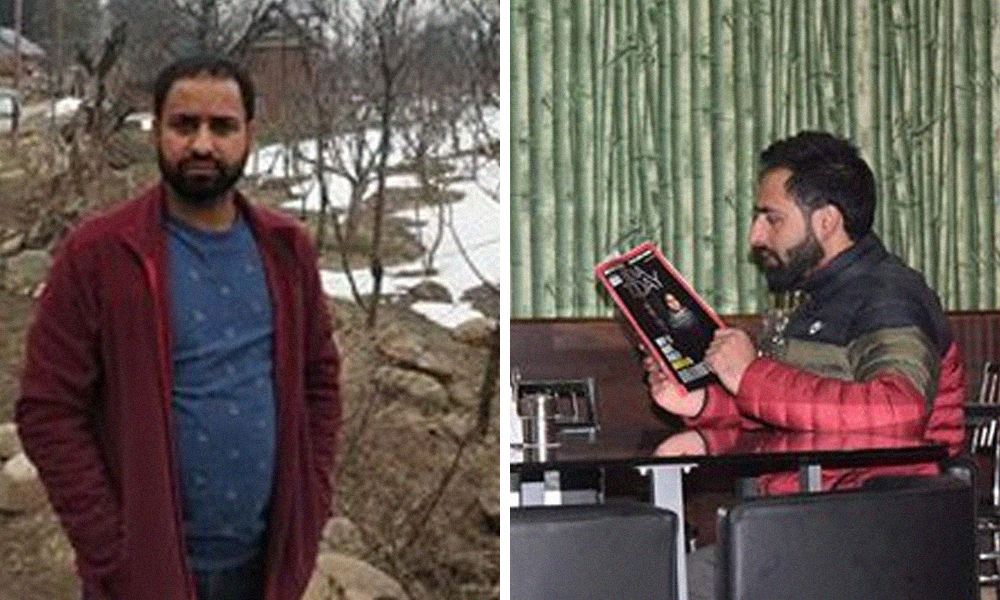
Internet Blockade Fallout: Kashmiri Journalists Innovatively Switching To Other Jobs
Jammu and Kashmir, 20 March 2020 2:38 PM GMT | Updated 28 Aug 2020 9:40 AM GMT
Creatives : Prateek Gautam |
A free soul who believes that journalism, apart from politics, should stand for social cause and the environment.
The recent internet blockade had rendered around 1 lakh people in Kashmir jobless which included many journalists.
Srinagar: Zeeshaan, 27, a former journalist with an English daily, The Kashmir Images, published from the summer capital of Jammu & Kashmir, is the owner of newly established restaurant, Read Coffee Cafe, at town outskirts in Pulwama region of South Kashmir.
He is one among the dozens of kashmiri journalists who lost their reporting/writing jobs due to longest internet blockade in Kashmir following the abrogation of article 370 and bifurcation of erstwhile state into two union territories - UT of Ladakh and UT of Jammu & Kashmir.
"I was unable to file stories to my office for around 7 months due internet gag, I waited for restoration of blocked communication channels and when internet was partially restored, I approached my office but they were not interested," says Zeeshaan.
This experience taught Zeeshaan that journalism is not a viable career option at a place where communication channels are frequently blocked. Ultimately, he decided to switch.
"You need to do some other job to sustain, some of my colleagues are still struggling to find new jobs; a few were compelled to do manual labour to support their families," he says.
The clampdown compelled Zeeshaan to start a restaurant, Read Coffee Cafe, which goes by the tagline: "Read over coffee."
Within a short span, Read Coffee Cafe carved a niche of customers, mostly educated class.
The customers enjoy good fast food. Simultaneously, they are served quality literature free of cost.
"The sole aim is not to sell food but to contribute to society. I believe reading makes a man a wise human being as they learn new things from these books. Each day, I devote one hour to reading and I ask others to do to the same," Zeeshaan says.
The response of customers has been tremendous as most of the books, which were pooled from different generous people and kept in the restaurant library, stand borrowed. The customers enjoy reading here, though they flip few pages over coffee or food but they are allowed to take books for reading at home.
After being discarded by his organisation where he worked for about two years, Zeeshaan, who has masters in International Relations from the Islamic University of Science and Technology, Awantipora, is exploring new opportunities.
"I can't kill the Journalist in me. I have been freelancing with some New Delhi based news websites including The Wire and Democracy News Live."
The frequent internet blockade has compelled another mid-career journalist from neighbouring Shopian district, Mir Iqbal, 31, to pursue entrepreneurship.
Mir, who worked as a Journalist for around 9 years, is a pass out from Kashmir University's department of Mass Communication and Journalism.
He was working as online editor for Kashmir Reader, another English daily published from Srinagar, before stripping of the special status of erstwhile state of Jammu & Kashmir.
"When internet was blocked on August 5, 2019, I was forced to do reporting," Mir recalls. "I was able to deliver because I had started from the ground zero, a man from desk experience only would have faced troubles," he says.
Earlier in 2016, after Hizbul Mujahideen commander, Burhan Muzaffar Wani, was killed in an encounter at Bamdoora village of Anantnag district, a similar clampdown was imposed in Kashmir that year to contain the mass uprising.
That year, Mir had witnessed many of his colleagues losing their jobs or their salaries were slashed.
He had taken a leaf from 2016 clampdown that sooner or latter he is going to switch.
"The recent internet blockade was a trigger, though, I had decided two months earlier, I took a leave and went ahead," Mir says.
The young man is the owner of Mir Agro Farms, a unit of packing and processing natural honey at the Industrial Growth Centre in Lassipora area of Pulwama.
Mir claims that his is the first of its kind initiative in Jammu & Kashmir.
Mir Agro Farms introduced honey sachets, Machh, in market to 'make honey affordable even for the poorest families.'
"A major chunk of population avoid sugar for their health. They need to be provided with some alternative which will make their menu sweet and healthy. This is what we aim at," explains Mir.
Mir Agro Farms is planning to introduce honey ginger, honey garlic and lemon honey in coming days.
"I advice people don't invest your time and energy on jobs which rely on internet because this modern facility is being frequently snapped here."
The recent internet blockade had rendered around 1 lakh people in Kashmir jobless which included many journalists.
Though, government restored broadband internet in Kashmir after seven months but cellular internet was partially restored with limited speed.
This ground report is written by Javid Sofi, a freelance reporter for The Logical Indian from Jammu and Kashmir.
Also Read: Kashmir's Kunan & Poshpora: What Has Indian Judiciary Done For Mass Rape Victims?
 All section
All section














